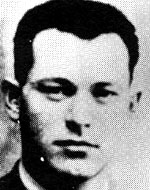Son of Bluma and Mordechai. Born in 1922/1910 in the city of Smorgon in the Wilkha Valley, he was the son of the Rabbis of Rabbis and Torah giants. From childhood, he absorbed the love of the Land of Israel and the longing for Zion in his parents’ home, and his parents, both teachers, gave him Hebrew speech. He was three years old when he immigrated with his parents to Eretz Israel in the summer of 1914. His father was invited to serve as a teacher at the Tachkemoni school in Tel Aviv, but half a year later the family was among the Jews who were deported by the Turks and wandered for eight years through Egypt, Moscow and Kovno. All the while David bought a lot of knowledge from his parents in Torah study, studied Hebrew and read a lot of modern Hebrew literature. In 1923 the family returned to Eretz Israel and his father returned to teach at the Tachkemoni school. At this school, David completed his studies and completed a government matriculation exam. The heroes of the Bible, the Hasmoneans, Bar Kokhba and Rabbi Akiva were impressed by this and from that time two plays were written – “The Spies” and “Korach” – as well as essays called “David” and “Shaul. In Jerusalem, and then began studying at the Hebrew University of Jerusalem, where he enrolled in the Department of Humanities and was known as an outstanding student in both the Department of Mathematics and the Department of Mathematics, and during the bloody riots of 1929 he joined the Volunteer Company of the Jerusalem Community Council. With the establishment of the Irgun Zvai Leumi (National Military Organization), following the events by commanders who left the Haganah in Jerusalem, he was one of the first to join the new defense organization. This organization, which was then known as the “National Defense” and “Haganah B”, underwent a “deputy course” and soon became prominent as a commander and a guide. On the other hand, he was involved in the translation and compilation of military manuals: “The Gun”, “The Assembled and Extended Order Exercises” and “The Guidance Theory.” In the spring of 1937, a division of the Irgun broke out in the wake of the debate in the Jewish Yishuv regarding the question of restraint and the response to the Arab attacks, and was appointed by the commander of the Jerusalem district. On November 14, 1937, the Jerusalem branch under his command gave the signal to “break the restraint” by organizing the organization’s first organized attack on the concentration of rioters in the capital, as the Irgun commander expanded his organization’s activity beyond a reaction on the Arab front, come. During the period of his command, there was also a great impetus for the organization’s participation in the Haapala and Betar immigration system. With the intensification of the confrontation with the British authorities due to the reaction of the organization, the authorities stepped up efforts to capture and arrest the chief commander. This happened to them on 19 May 1939. He was first held in the Acre prison, then transferred to the Zrifin detention camp and released shortly after the outbreak of World War II with the Irgun’s declaration of cessation of anti-British activities and the Allied war in Nazi Germany. The Irgun Zvai Leumi in Israel, which subsequently changed its name to the Fighters of Herut Israel (Lehi), continued to fight the Germans, and in May 1941 he himself, along with three of his subordinates, To a group in Iraq for a sabotage and intelligence operation against the Germans and their Iraqi allies, who set up military bases in their country on 20.5.1944 1) At the height of the operation, Raziel was attacked by German planes, and Raziel was killed and buried in the military cemetery in the bunker.She was buried in the military cemetery in Jerusalem. After his burial in Israel, he was awarded the rank of Major General in the IDF. In his full military service, Menachem Begin, the last commander of the Irgun and later the Prime Minister of Israel, eulogized him. He noted “a wonderful figure of soldier and commander, warrior and rebel, Safra and Sayfa”. David Raziel left a wife, Shoshana nee Spitzer. The day of his fall is the anniversary of the anniversary of the Irgun Zvai Leumi. It is named after the Ramat Raziel moshav in the Judean Hills, the Beitar youth farm in Herzliya and many streets in the cities of Israel bearing the name of the man who said, “You have no mountain that will not be conquered by the power of sacrifice.” The chapters of his life and heroism also appear in the Yizkor Book Netzach “, and in the book” Maalot Warriors “.
